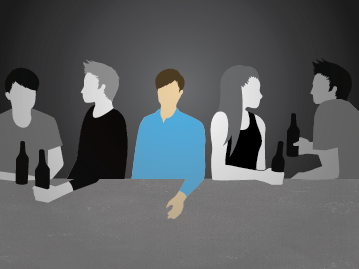
Some students are starting 2019 differently, by cutting out partying. Many of them are doing so as part of “Dry January,” a commitment to abstain from drinking alcohol for the first month of the year.
But the prevalence of drinking in college environments leaves some students feeling isolated at times.
The 2015 National Survey on Drug Use and Health found full-time college students had a higher prevalence of drinking than other people aged 18-22.
“Drinking with friends can be a very communal and fun thing to do,” said Issa Kabeer, a 2010 religion alumnus and diversity leadership graduate student. “If you are not doing it, it can make you feel like a loner and outside of your group of friends.”
Kabeer is taking on the challenge this year because of the health benefits.
Abstaining from alcohol for a month can decrease depression and improve sleep quality and skin complexion, Bustle reported. The British Journal of General Practice also found increased energy, weight loss and saving money to be positive benefits for participants of Dry January.
Additionally, alcohol use increases the risk of cancers of the mouth, liver, esophagus and breast.
According to a 2015 report by the National Institute on Alcohol Abuse and Alcoholism, alcohol contributes to approximately 1,825 deaths of college students aged 18-24 each year. The report also found about 25 percent of college students suffer academic consequences from drinking and 20 percent of college students meet the criteria for Alcohol Use Disorder.
The first organized Dry January took place in 2013 in the United Kingdom. It was part of a campaign started by Alcohol Change UK, to promote well-being and “make not drinking, whether for an evening, a month or longer, feel more normal.”
Kabeer said he expanded his definition of Dry January by swearing off smoking marijuana. He added that he felt pressure from friends to break this resolution.
“My very good friend pressured me to smoke,” Kabeer said. “I refused. She seemed upset by my choice not to.”
Marijuana use has both positive and negative side effects. According to the National Institute on Drug Abuse, negative effects include breathing problems similar to those caused by smoking tobacco and impairment of memory and learning functions, especially if a person has been using marijuana frequently since their teenage years.
“It made me look different [from others] because I wasn’t smoking,” Kabeer said. “However, I am happy by my decision not to because I didn’t do what I didn’t want to do.”
He added that he has no regrets about his decision.
“Dry January shows that you have self-control,” Kabeer said. “It shows that you can have leadership in a good cause.”
Lyle Drescher, a junior film and media arts major, cut back on drinking beer for health and fitness reasons.
“Beer is really bad for you,” Drescher said. “It makes you really fat and also makes you feel bad. I chose it as a resolution because it’s part of an overall effort to live a better life.”
Drescher added that he often overeats after drinking beer.
While the January is a popular time to bring on these lifestyle changes, the new year isn’t the only gateway to sobering up for students.
Merry Reed, a senior elementary education major, made a long-term commitment to sobriety in early 2018. Reed said she knew she was dependent on alcohol at the age of 21 and swore it and other mind-altering substances off.
“I chose to make this change because I recognized that, for me, alcohol contributed nothing positive to my life” Reed said. “It made me miserable, cost me money and time, and I hated both drinking and not drinking.”
Reed felt supported by her close friends in this decision, which made the transition easier, she added.
“There’s this big idea that heavy drinking is just what you do in college, that you have to party and go clubbing, and drink jello shots in a frat house to have fun,” Reed said. “I have way more fun now than I ever did with a drink in my hand.”


Be the first to comment